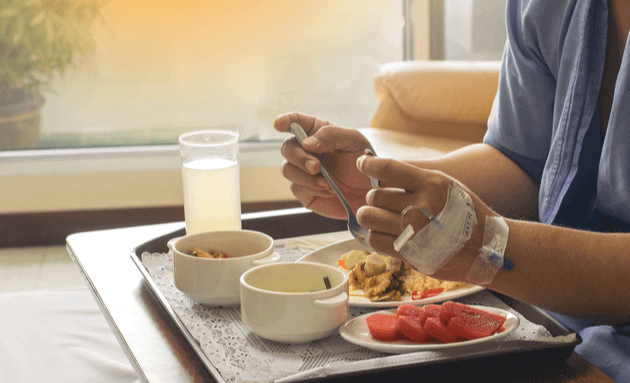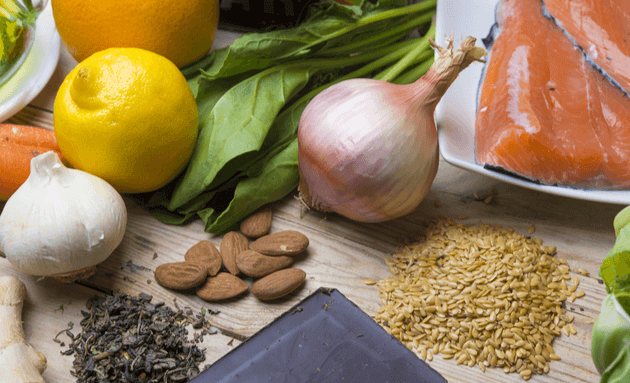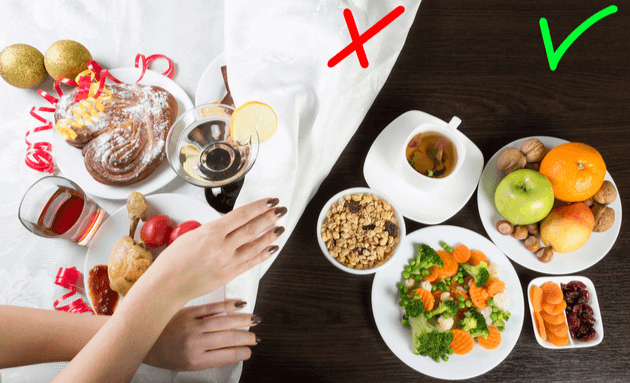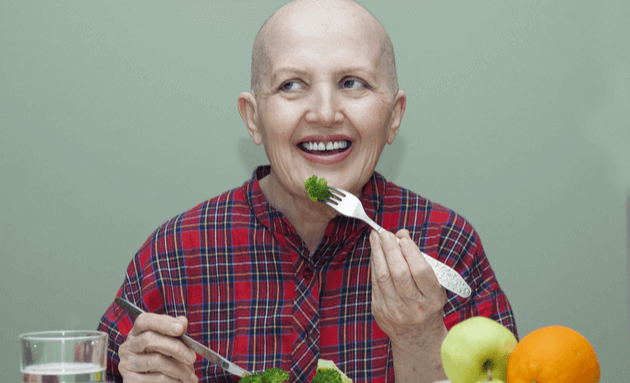What Foods To Eat During Cancer Treatment
Radiation therapy, chemotherapy, hormone therapy, biological immunotherapy, and/or surgery can take a toll on one’s health, affecting one’s appetite and leaving them feeling weak. It therefore becomes very important to maintain proper nutrition during cancer treatment.

Cancer medications can cause nausea, while radiation treatment can make the mouth sore, affect taste buds, and lead to a loss of appetite, thereby increasing the chances of malnutrition. A balanced diet, packed with nutrients can restore strength and help stay energetic throughout the treatment. One can maintain a healthy body mass, improve stamina levels to tolerate the side effects of treatment, and aid in faster recovery.
A healthy diet will also reflect in the patient’s blood profile. This is critical because adequate levels of platelets, neutrophils and albumin are necessary, in order to receive therapy with minimal breaks.
Eat Well - The Overall Approach to Meals

Good news is that you should not have too many dietary restrictions. This is a tough time, with cancer treatments causing side-effects like nausea and a loss of appetite. Eat whatever you want as long as it is healthy. Fresh fruits, vegetables, nuts and if possible, meats - they should all be a part of your diet.
Preferred methods of cooking should be steaming, boiling and stir frying. Avoid deep frying, grilling or baking. Pack in a lot of flavors to make this enjoyable though go easy on salt, sugar and oil- as little as possible. Every day, make sure you have a mix of all the core 7 nutrients needed by our body. Protein to repair tissues and prevent infection; Carbohydrates and Fats to provide energy and Vitamins and Minerals for the proper functioning of the body. Fiber and Water will help replenish.
The food needs to well managed also, to avoid infections. Refrigerate properly, clean and cook thoroughly and serve in very hygienic conditions. No one with flu or cold should handle the food. Focus on eating multiple small meals instead of large meals.
FOODS TO EAT
From the pool of all healthy fruits, vegetables and meats, pick what you like and find comforting. Trying out new foods is a good idea but it is avoid extreme diets as they may not provide complete nutrition. The following foods can be used to provide the required nutrients when undergoing cancer treatment:
1. Vegetables: Boiled or blanched vegetables are a good way to improve nutrient intake during treatment. Include tomatoes, carrots, pumpkin, turnips, and leafy greens such as spinach and methi in the patient’s diet as they are a rich source of vitamins, calcium, iron, and fibre. Cruciferous vegetables like broccoli, cauliflower, and cabbage are also a good addition as they contain phytochemicals that can reduce cancer risk as well as the risk of a relapse. You are free to use any condiments to make this flavorful and appealing for the patient.
2. Fruits: Citrus fruits and their juices such as oranges, lemons, and limes are excellent during treatment due to their high Vitamin C content. Other fruits like bananas, kiwi, peaches, mangoes, pears, and strawberries provide essential vitamins and fibre. Avocadoes, guava, apricots, figs, prunes, raisins and other nutrient dense fruits are a good source of energy.
3. Protein: As the body repairs itself during cancer treatment, a steady intake of protein is important for maintaining body mass. Lean meats such as fish and poultry, dairy products, nuts, dals, tofu and chickpeas are good sources of protein that can be easily digested during treatment.
4. Carbohydrates: Carbohydrates are required to keep energy levels up during treatment. Rice, whole wheat chapatti and bread, oats, corn, beans, potatoes, and dairy products are a good source of carbohydrates.
FOODS TO AVOID
Due to side effects of cancer treatment such as nausea, taste changes, and mouth sores, one may already be aware of foods that they need to steer clear of. However, there are some foods best avoided, no matter how they taste or appear. Two primary reasons for the type of foods to avoid - one is to maximise nutrition in each meal and not waste it on nutrient deficit foods. Second main reason is to avoid infections. This is critical because foodborne illnesses are common at this stage. The weak immune system continues for a few weeks and longer, if the patient is undergoing stem cell or bone marrow transplant. Food poisoning shouldn’t be taken lightly since it can turn fatal in certain cases.
Avoid the following foods entirely, even if the patient may have eaten them with no problems in the past:
- Unpasteurised (raw) milk and milk products, including raw milk yoghurt
- Unwashed fresh fruits and vegetables, especially leafy and root vegetables that contain dirt and other contaminants
- Unpasteurized fruit juice or cider
- Raw sprouts like alfalfa (lusan ghas) and moong
- Excessive oily, salty, and sugary foods like deep fried chips, jams, and pickles
- Undercooked eggs, such as soft boiled, half fried, and poached
- Deep fried, grilled, and barbequed meats as they are exposed to high heat, creating carcinogenic or burnt byproducts
- Red meat, cold-cuts and processed meats such as ham, and sausages
- Dry, smoked or raw fish

Ease Side Effects With Food
Certain foods can help ease the common side effects arising from cancer treatment. Eating high-fibre foods like beans, lentils, vegetables, and fresh or dried fruits, along with adequate consumption of water can help to tackle constipation.

Apples, bananas, rice, and other bland foods can help patients suffering from diarrhoea during treatment. To manage dry mouth and mouth sores, grinding or pureeing foods is recommended as it will help the patient swallow the food easily. Similarly, soft and liquid foods like soups, milk, and yoghurt shakes can help to ease mouth sores and aid in digestion.
If the patient is suffering from nausea, choose foods that are bland and do not have any strong odours. Greasy and heavy foods are a big no-no if the patient is feeling queasy. Consuming small meals throughout the day and drinking enough water can help the patient deal with nausea.
Supplements And Cancer Treatment
Although it may be tempting to go opt for supplements to replenish the nutrients required during cancer treatment, some dietary and herbal supplements may interfere with the treatment. It’s important to talk to the doctor about taking any supplements. Even if they are over-the-counter vitamin supplements, it’s best to seek help from a specialised dietician and a doctor. Ask them to create customised meal plans if the patient is falling short on any essential nutrients.






